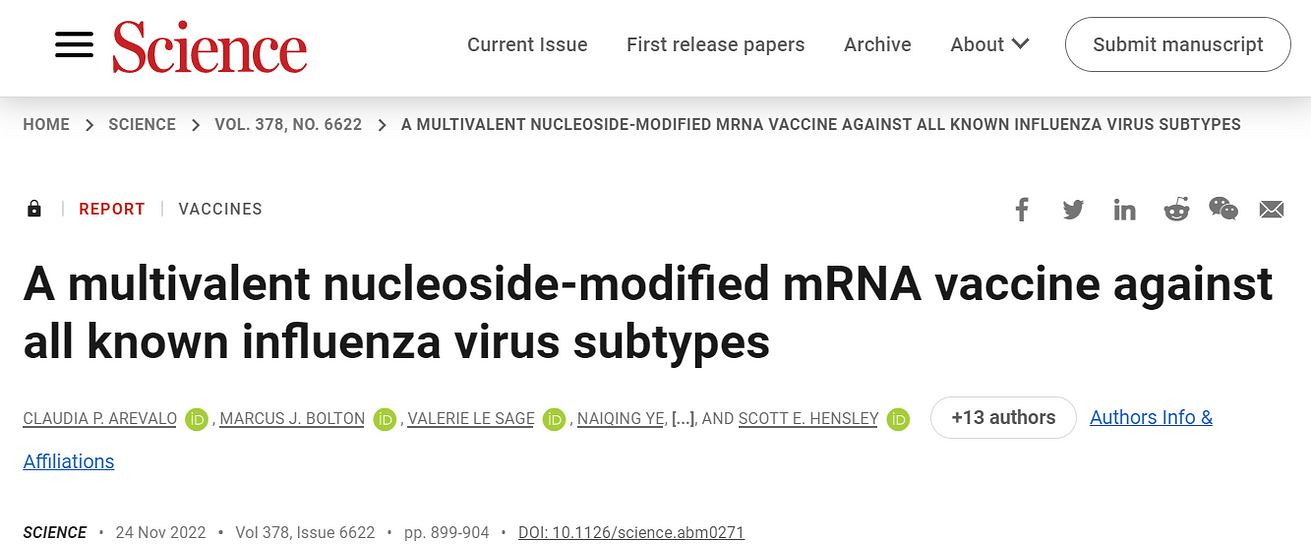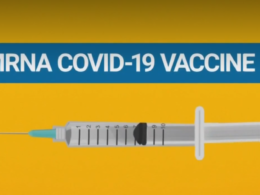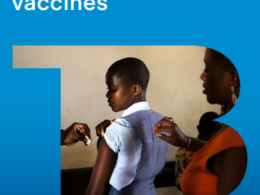health transformation institute
the most comprehensive knowledge portal for health transformation
Joaquim Cardoso MSc*
Founder, CEO and CSO
November 24, 2022
MSc* from London Business School — MIT Sloan Masters Program
Executive Summary:
What is the innovation?
- An experimental vaccine provided broad protection against all 20 known influenza A and B virus subtypes in initial tests in mice and ferrets, …
- … potentially opening a pathway to a universal flu shot that might help prevent future pandemics, according to a U.S. study published on Thursday.
- The two-dose vaccine employs the same messenger RNA (mRNA)technology used in the COVID-19 shots developed by Pfizer with BioNTech, and by Moderna.
What are the benefits?
- A universal vaccine would not mean an end to flu seasons, but would replace the guess work that goes into developing annual shots months ahead of flu season each year.
- The universal flu vaccine, if successful in human trials, would not necessarily prevent infection. The goal is to provide durable protection against severe disease and death
How does it work?
- Unlike standard flu vaccines that deliver one or two versions of hemagglutinin, …
- … the experimental vaccine includes 20 different types in the hope of getting the immune system to recognize any flu virus it might encounter in the future.
- In lab experiments, vaccinated animals’ immune systems recognized the hemagglutinin proteins and defended against 18 different strains of influenza A and two strains of influenza B.
- Antibody levels induced by the vaccine remained unchanged for at least four months, according to a report published in the journal Science.
Who is doing it?
- Moderna and Pfizer both have mRNA flu vaccines in late-stage human trials, and GSK and partner CureVac, are testing an mRNA flu vaccine in an early-stage safety trial in humans.
- These vaccines are designed to defend against only four recently-circulating influenza strains but could theoretically be changed up each year
ORIGINAL PUBLICATION (reuters)

Researchers test mRNA technology for universal flu vaccine
Reuters
Reporting by Nancy Lapid; Editing by Christine Soares and Bill Berkrot
November 24, 2022
An experimental vaccine provided broad protection against all 20 known influenza A and B virus subtypes in initial tests in mice and ferrets, …
… potentially opening a pathway to a universal flu shot that might help prevent future pandemics, according to a U.S. study published on Thursday.
The two-dose vaccine employs the same messenger RNA (mRNA)technology used in the COVID-19 shots developed by Pfizer with BioNTech, and by Moderna.
It delivers tiny lipid particles containing mRNA instructions for cells to create replicas of so-called hemagglutinin proteins that appear on influenza virus surfaces.
A universal vaccine would not mean an end to flu seasons, but would replace the guess work that goes into developing annual shots months ahead of flu season each year.
A universal vaccine would not mean an end to flu seasons, but would replace the guess work that goes into developing annual shots months ahead of flu season each year.
“The idea here is to have a vaccine that will give people a baseline level of immune memory to diverse flu strains, so that there will be far less disease and death when the next flu pandemic occurs,” study leader Scott Hensley of the Perelman School of Medicine at the University of Pennsylvania said in a statement.
Unlike standard flu vaccines that deliver one or two versions of hemagglutinin, …
… the experimental vaccine includes 20 different types in the hope of getting the immune system to recognize any flu virus it might encounter in the future.
In lab experiments, vaccinated animals’ immune systems recognized the hemagglutinin proteins and defended against 18 different strains of influenza A and two strains of influenza B.
Antibody levels induced by the vaccine remained unchanged for at least four months, according to a report published in the journal Science.
The vaccine reduced signs of illness and protected from death even when the ferrets were exposed to a different type of flu not in the vaccine, the researchers said.

Moderna and Pfizer both have mRNA flu vaccines in late-stage human trials, and GSK and partner CureVac) are testing an mRNA flu vaccine in an early-stage safety trial in humans.
These vaccines are designed to defend against only four recently-circulating influenza strains but could theoretically be changed up each year.
The universal flu vaccine, if successful in human trials, would not necessarily prevent infection. The goal is to provide durable protection against severe disease and death, Hensley said.
The universal flu vaccine, if successful in human trials, would not necessarily prevent infection. The goal is to provide durable protection against severe disease and death…
Questions remain regarding how to judge efficacy and potential regulatory requirements for a vaccine against possible future viruses that are not currently circulating, Alyson Kelvin and Darryl Falzarano of the University of Saskatchewan, Canada, wrote in a commentary published with the study.
While the promising results with the new vaccine “suggest a protective capacity against all subtypes of influenza viruses, we cannot be sure until clinical trials in volunteers are done,” Adolfo García-Sastrem, director of the Institute for Global Health and Emerging Pathogens at Mount Sinai Hospital in New York, said in a statement.
Originally published at https://www.reuters.com on November 24, 2022.
Names mentioned
Study leader Scott Hensley of the Perelman School of Medicine at the University of Pennsylvania
Alyson Kelvin and Darryl Falzarano of the University of Saskatchewan, Canada, wrote in a commentary published with the study.
Adolfo García-Sastrem, director of the Institute for Global Health and Emerging Pathogens at Mount Sinai Hospital in New York, said in a statement.
REFERENCE ARTICLE (science)

A multivalent nucleoside-modified mRNA vaccine against all known influenza virus subtypes
Science
CLAUDIA P. AREVALO , MARCUS J. BOLTON , VALERIE LE SAGE , NAIQING YE, COLLEEN FUREY, HIROMI MURAMATSU , MOHAMAD-GABRIEL ALAMEH, NORBERT PARDI, ELIZABETH M. DRAPEAU , KAELA PARKHOUSE TYLER GARRETSON, JEFFREY S. MORRIS , LOUISE H. MONCLA , YING K. TAM STEVEN H. Y. FAN, SEEMA S. LAKDAWALA, DREW WEISSMAN , AND SCOTT E. HENSLEY
24 Nov 2022
A cornucopia of antigens
Vaccines serve as an indispensable tool for the control and prevention of influenza, but several challenges remain.
Some populations, for example, the elderly, respond poorly to vaccination.
Furthermore, the highly variable nature of influenza viruses can make targeting optimal antigens difficult.
Broadly neutralizing antibodies have been proposed as a solution to such disadvantages, but they present their own pitfalls, including limited cross-reactivity to both influenza A and B strains and the need for repeated injections during flu season.
Arevalo et al. developed a nucleoside-modified messenger RNA-lipid nanoparticle vaccine encoding hemagglutinin antigens from all 20 known influenza A and B virus subtypes (see the Perspective by Kelvin and Falzarano).
Such vaccines may provide protection against antigenically variable viruses by simultaneously inducing antibodies against multiple antigens. — STS
Abstract
- Seasonal influenza vaccines offer little protection against pandemic influenza virus strains.
- It is difficult to create effective prepandemic vaccines because it is uncertain which influenza virus subtype will cause the next pandemic.
- In this work, we developed a nucleoside-modified messenger RNA (mRNA)–lipid nanoparticle vaccine encoding hemagglutinin antigens from all 20 known influenza A virus subtypes and influenza B virus lineages.
- This multivalent vaccine elicited high levels of cross-reactive and subtype-specific antibodies in mice and ferrets that reacted to all 20 encoded antigens.
- Vaccination protected mice and ferrets challenged with matched and mismatched viral strains, and this protection was at least partially dependent on antibodies.
- Our studies indicate that mRNA vaccines can provide protection against antigenically variable viruses by simultaneously inducing antibodies against multiple antigens.
Our studies indicate that mRNA vaccines can provide protection against antigenically variable viruses by simultaneously inducing antibodies against multiple antigens.












